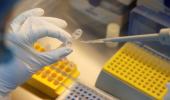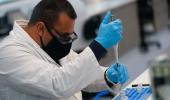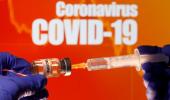United Kingdom-based biopharma giant AstraZeneca has said that the phase 3 testing of its COVID-19 vaccine being developed with Oxford University has been put on hold, due to a suspected serious adverse reaction in a participant in the United Kingdom.

The company said that its "standard review process triggered a pause to vaccination to allow the review of safety data," health news site Stat News reported on Tuesday (local time).
The nature of the adverse reaction and when the development took place were not initially clear, although the participant is expected to recover, said an individual familiar with the matter.
The spokesperson termed the pause as "a routine action which has to happen whenever there is a potentially unexplained illness in one of the trials, while it is investigated, ensuring we maintain the integrity of the trials."
The spokesperson said the company is "working to expedite the review of the single event to minimise any potential impact on the trial timeline."
An individual familiar with the matter said that trial was paused out of "an abundance of caution."
A second individual, who is also aware of the development said the finding has impacted other AstraZeneca vaccine trials that are underway and other clinical trials being conducted by several vaccine manufacturers.
It is not known when the clinical trial of the AstraZeneca's vaccine will resume.
However, the progress of the company's trial and other COVID-19 vaccines in development are being closely watched even as the COVID-19 pandemic continues to wreak havoc across the world.
It is to be noted that AstraZeneca is the first Phase 3 COVID-19 vaccine trial known to have been paused.
AstraZeneca began its Phase 3 trials in the United States in August. The trial in the US is currently underway at 62 sites across the country, according to clinicaltrials.gov, a government registry, although some have not started enrolling participants.
Phase 2 and 3 trials previously began in the UK, South Africa and Brazil.
According to a Phase 1/2 study published in July, around 60 per cent of 1,000 participants experienced side effects after being administered the vaccine. All the side effects like fever, headaches, muscle pain and injection site reactions were deemed mild or moderate, according to Stat News.
The vaccine -- known as AZD1222 -- uses an adenovirus that carries a gene for one of the proteins in SARS-CoV-2, the virus which causes COVID-19. The adenovirus is designed to induce the immune system for a protective response against SARS-CoV-2. While the platform has not been used in an approved vaccine, it has been tested in experimental vaccines against other viruses, including the Ebola virus, the report said.
The Phase 3 trial in the US seeks to register around 30,000 participants at 80 sites across the country, said the National Institutes of Health in a last week's statement.
In response to the trial pause, it was not clear what steps were being taken at study sites in the US.
According to the AstraZeneca statement, the drug giant said that "in large trials, illnesses will happen by chance but must be independently reviewed to check this carefully."
The spokesperson also said the company is "committed to the safety of our participants and the highest standards of conduct in our trials."











 © 2024 Rediff.com -
© 2024 Rediff.com -